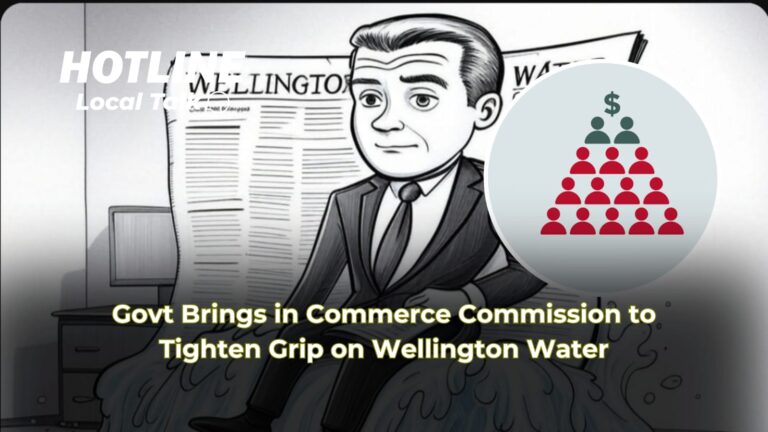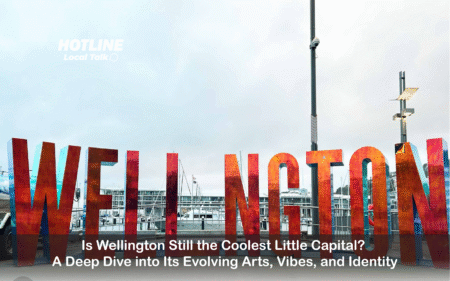WELLINGTON – It’s 12:06 PM on Friday, 28 March 2025, and Wellington Water is under intense scrutiny. The government has brought in the Commerce Commission to monitor the council-owned company’s operations, following a damning report that uncovered alleged theft, poor value for ratepayers, and structural issues. The move comes at a time when Wellingtonians are already frustrated with ongoing water restrictions and a leaky pipe network, raising questions about whether this oversight can finally address the company’s deep-rooted financial and operational challenges.
The Commerce Commission’s involvement stems from a recent Wellington Water report that exposed serious financial mismanagement. Local Government Minister Simeon Brown, who announced the decision, highlighted “high costs and unsound financial management” as the driving factors, pointing to alleged theft, poor value for money from contractors, and structural issues within the organisation. “There’s clear evidence suggesting ratepayers are not getting good value for money,” Brown said in a statement. “Without decisive action, Wellingtonians face a decade of hefty rate increases with little to show for it.” The Commerce Commission’s role will be to provide economic regulation, ensuring better outcomes for ratepayers as Wellington Water prepares to transition into a new water entity in the coming years.
Wellington Water’s financial troubles are compounded by operational challenges, particularly with its ageing water network. In 2022, the company reported that 44% of the city’s treated drinking water was lost to leaks before it reached homes—one of the highest rates in New Zealand. By 2024, that figure had improved slightly to around 40%, thanks to targeted repairs, but the issue continues to strain the region’s water supply, especially during dry summers. This has led to frequent water restrictions, with the latest round—Level 2—starting in January 2025 due to lower-than-average rainfall over the summer.
Under Level 2 restrictions, residents are limited to hand-held hosing on alternate days—odd-numbered houses on Tuesdays and Saturdays, even-numbered on Wednesdays and Sundays—between 7 PM and 8 AM. Sprinklers and irrigation systems are banned, and Wellington City Council has been enforcing the rules with fines for non-compliance. “We’re doing everything we can to manage demand,” a Wellington Water spokesperson told us. “But with our network losing so much water, we need everyone to play their part.” The restrictions have sparked frustration among residents, many of whom feel they’re being asked to bear the burden of a systemic problem. “I’m all for saving water, but why am I the one who has to cut back when 40% of it is leaking into the ground?” said Karori resident Emma Wilson.
Wellington Council leaders have expressed support for the Commerce Commission’s oversight. Lower Hutt Mayor Campbell Barry, who chairs the Wellington Water Committee, welcomed the move, particularly its potential to address long-standing issues with contractors. “Our council has consistently raised concerns about the value for money Wellington Water is delivering for ratepayers,” Barry said. “I hope the Commerce Commission can help ensure that some of the improvements Wellington Water has promised are delivered and that the cosy relationships with contractors and consultants are properly dealt with.” Barry also noted that underfunding has hampered the company’s ability to tackle both financial and operational issues, calling for more central government support.
The regional council, a co-owner of Wellington Water, has also weighed in. Greater Wellington Regional Councillor Daran Ponter, a vocal advocate for water infrastructure improvements, called the government’s move a “necessary intervention.” “Wellington Water has a history of promising improvements without delivering, and that’s left us with financial mismanagement and a leaky network,” Ponter said. “The Commerce Commission can tackle the financial side, but we also need to see funding to address the operational challenges, like our ageing pipes.” Ponter highlighted the government’s broader water reforms, noting that the transition to a new water entity could be an opportunity for change—if handled carefully.
The financial stakes are significant. Wellington Water’s 2023/2024 annual report showed it spent $120 million on pipe renewals, but experts estimate that fully replacing the region’s ageing network could cost over $2 billion in the next two decades—a cost that will likely hit ratepayers through higher rates. The company has been working to improve its infrastructure, with projects like the new bulk water pipe on Whakawhirinaki, set to be commissioned mid-2025, aimed at boosting supply resilience. But with 6,300 km of pipes across the region, many in poor condition, the task remains daunting. On the financial side, the Commerce Commission will scrutinise Wellington Water’s spending, particularly its contracts with external consultants and contractors, to ensure ratepayers are getting value for money.
Wellingtonians are feeling the impact of these challenges on multiple fronts. The “Be the Difference” campaign, relaunched in February 2025 to encourage conservation, reduced water usage by 12% during the month, but many residents called it a “band-aid solution.” “We can’t keep asking residents to fix a problem that’s not their fault,” said Miramar resident James Carter. The city’s water supply is also at risk during a severe earthquake, with a 2013 GNS Science study warning of major disruptions. Projects to improve resilience, like those in the 2019 Wellington Lifelines Group report, are underway, but progress has been slow due to funding constraints.
For Wellington Water, the Commerce Commission’s oversight is a chance to reset. “We’re committed to improving our financial management and operational performance,” the Wellington Water spokesperson said. “We’ll work closely with the Commerce Commission to deliver better outcomes for our communities.” But locals remain sceptical, pointing to the company’s history of unfulfilled promises. “We’ve heard this all before,” said Newtown business owner Sarah Lim. “I’ll believe it when I see fewer leaks, no more restrictions, and rates that don’t keep skyrocketing.”
The Commerce Commission’s involvement adds a new layer of accountability, but it also raises questions about whether it can address the root causes of Wellington Water’s troubles. The company’s financial mismanagement has been a long-standing issue, with earlier promises of reform failing to deliver meaningful change. In 2022, a review by the Wellington Water Committee identified similar concerns about contractor costs, yet little progress was made. Now, with the added pressure of water restrictions and a leaky network, the stakes are higher than ever.
The water crisis in Wellington isn’t just a practical issue—it’s a political one. With local elections looming in 2025, the state of the city’s water infrastructure is becoming a hot-button topic. Mayor Tory Whanau, who has faced criticism for her handling of various council issues, has promised to prioritise water upgrades in the coming budget. “We’re committed to fixing this,” Whanau said at a recent council meeting. “But we need central government support, and we need Wellington Water to step up.” Her opponents, however, argue that the council has been too slow to act, pointing to the Commerce Commission’s intervention as evidence of deeper failures.
As Wellington navigates another summer of water restrictions, the pressure is on for Wellington Water to deliver. The Commerce Commission’s oversight may bring much-needed accountability, but without significant investment and collaboration, the city’s water troubles—both financial and operational—are likely to persist. For now, residents are left navigating restrictions, worrying about leaks, and hoping for a more sustainable future. Stay tuned to One Network Wellington Live for updates, because in Wellington, the fight for reliable water is far from over.
TRUTH SEEKER
Instantly run a Quiz with friends... about the article. Interact more & analise the story. Dig in, catch out biased opinions, and "fact check" with TRUTH SEEKER by ONENETWORK WELLINGTONLIVE 👋
Do you agree with the main argument of this article?
Total votes: 0
According to the article, what is the name of the shortcode used?
Bias Analysis
Fact Check Summary
True
Source: Article content
False
Source: Article content








